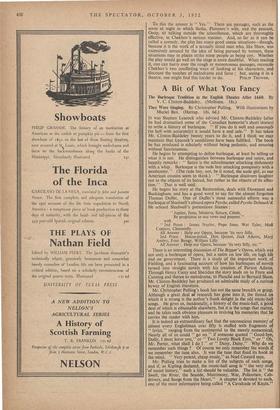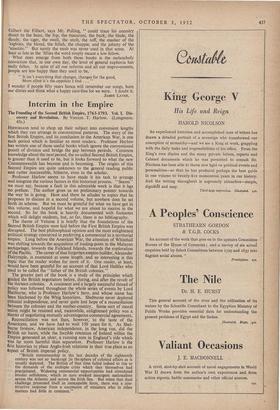A Bit of What You Fancy
The Burlesque Tradition in the English Theatre After 1660. By V. C. Clinton-Baddeley. (Methuen. 18s.) IT was Stephen Leacock who advised Mr. Clinton-Baddeley (after he had dramatised some of the Canadian humorist's short stories) to write a history of burlesque. " If you do it well and amusingly (to hell with accurately) it would have a real sale." It has taken Mr. Clinton-Baddeley twenty years to do it, and I think we may maintain that Leacock's conditions have been fulfilled. The book he has produced is scholarly without being pedantic, and amusing without facetiousness.
He begins by attempting to define burlesque, at least by telling us what it is not. He distinguishes between burlesque and satire, and happily remarks : " Satire is the schoolmaster attacking dishonesty with a whip. Burlesque is the rude boy attacking pomposity with a peashooter." (The rude boy, not, be it noted, the nude girl, as our American cousins seem to think.) " Burlesque discovers laughter not in the objects of its hatred, but rather in the objects of its affec- tion." That is well said.
He begins his story at the Restoration, deals with Davenant and Buckingham, and has a good word to say for the almost forgotten Thomas buffet.. One of Duffet's most successful efforts was a burlesque of Shadwell's absurd opera Psyche, called Psyche Debauch'd. He echoed Shadwell's pretentious litanies : " Jupiter, Juno, Minerva, Saturn, Cibele,
Be propitious to our vows and prayers."
with " 2nd Priest : James Naylor, Pope Joan, Wat Tyler, Moll Cutpurs, Chocorelly.
All Answer : Help our Opera, because 'tis very Silly. 2nd Priest : Hocus-pocus, Don Quixot, Jack Adams, Mary Ambry, Frier Bungy, William Lilly.
All Answer : Help our Opera, because `tis very Silly, etc."
There is an interesting discussion of The Beggar's Opera, which was not only a burlesque of opera, but a satire on low life, on high life and on government. There is a study of the important work of Fielding, and a fascinating account of how his burlesques of novels turned into straight novels with his creation of Parson Adams. Through Henry Carey and Sheridan the story leads on to Frere and Canning and thence to melodrama, to Planche and to Bernard Shaw. Mr. Clinton-Baddeley has produced an admirable study of a curious byway of English literature.
Mr. Christopher Pulling's book has not the same breadth or grasp. Although a great deal of research has gone into it, the thread on which it is strung is the author's frank delight in the old music-hall songs. He gives us, incidentally, a history of the music-hall, a good deal of which is obtainable elsewhere, but it is the songs that matter, and he takes such obvious pleasure in reviving his memories that he carries the reader with him.
It is indeed an extraordinary fact that the unconscious memory of almost every Englishman over fifty is stuffed with fragments of " lyrics," ranging from the sentimental to the merely nonsensical. Nearly all of us could " go on " if someone quoted " Good-bye, Dolly, I must leave you," or " Two Lovely Black Eyes," or " Oh, Mr. Porter, what shall I do ? " or " Daisy, Daisy." Why do wq remember such things ? Of course we only remember the words if we remember the tune also. It was the tune that fixed its hook in the mind. " Very potent, cheap music," as Noel Coward says. Mr. Pulling tries to make a list of the subjects of such songs, and if, as Kipling declared, the music-hall song is " the very stuff of social history," such a list should be valuable. The list is " the Swell, the River, the Seaside, Matrimony, War, Policemen, Cab- drivers, and Songs from the Heart." A chapter is devoted to each, one of the most informative being called "A Cavalcade of Knuts."
Gilbert the Filbert, says Mr. Pulling, " could trace his ancestry direct to the beau, the fop, the macaroni, the buck, the blade, the dandy, the tiger, the swell, the snob, the toff, the masher of the 'eighties, the blood, the fellah, the chappie, and the johnny of the 'nineties." But surely the snob was never used in that sense. At What does emerge from both these books is the melancholy eetkak least as late as the 'fifties the word simply meant a low fellow.
conviction that, in our own day, the level of general euphoria has sadly fallen. In spite of all our reforms and all our improvements, people are less happy than they used to be.
" It isn't everything that changes, changes for the good, More often it's the opposite I find . . . "
I wonder if people fifty years hence will remember our songs, hum our ditties and think what a happy care-free lot we were. I doubt it.
JAMES LAVER.



















































 Previous page
Previous page